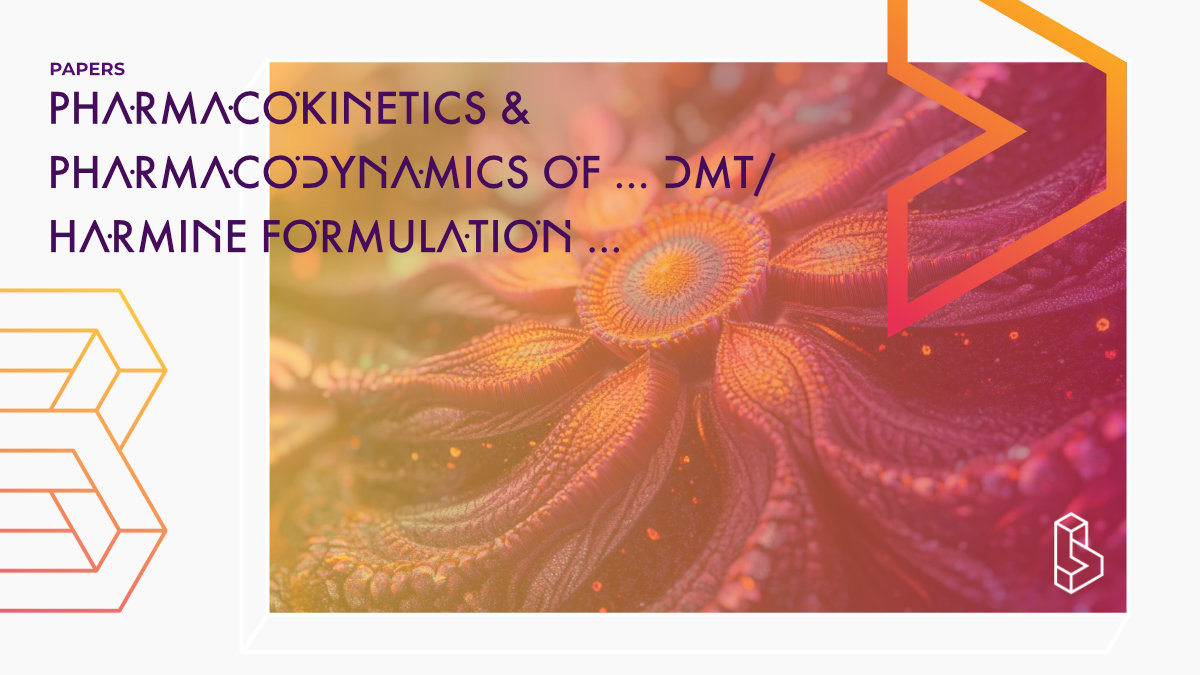This secondary analysis of an RCT (n=31) evaluates a novel pharmaceutical formulation of DMT and harmine in healthy male volunteers. The study finds that intranasal DMT and buccal harmine (pharmahuasca) produce consistent pharmacokinetic profiles and safe, well-tolerated effects resembling ayahuasca, with subjective experiences lasting 2–3 hours. This formulation is proposed as a safer, standardised alternative for potential therapeutic use in mental health disorders.
Abstract of Pharmacokinetics and Pharmacodynamics of an Innovative Psychedelic DMT/Harmine Formulation in Healthy Participants
“Background Recent interest in the clinical use of psychedelics has highlighted plant-derived medicines like ayahuasca showing rapid-acting and sustainable therapeutic effects in various psychiatric conditions. This traditional Amazonian plant decoction contains N,N-dimethyltryptamine (DMT) and β-carboline alkaloids such as harmine. However, its use is often accompanied by distressing effects like nausea, vomiting, and intense hallucinations, possibly due to complex pharmacokinetic/pharmacodynamic (PK-PD) interactions and lack of dose standardization.
Methods This study addresses these limitations by testing a novel pharmaceutical formulation containing pure forms of DMT and harmine in a double-blind, randomized, placebo-controlled trial with 31 healthy male volunteers. We evaluated PK-PD by monitoring drug and metabolite plasma levels, subjective effects, adverse events, and cardiovascular parameters. Each participant received three randomized treatments: 1) 100 mg buccal harmine with 100 mg intranasal DMT, 2) 100 mg buccal harmine with intranasal placebo, and 3) full placebo; using a repeated-intermittent dosing scheme, such that 10 mg of DMT (or placebo) was administered every 15 minutes.
Results DMT produced consistent PK profiles with Cmax values of 22.1 ng/ml and acute drug effects resembling the psychological effects of ayahuasca with a duration of 2–3 hours. Likewise, buccal harmine produced sustained-release PK profiles with Cmax values of 32.5 ng/ml, but lacked distinguishable subjective effects compared to placebo. All drug conditions were safe and well tolerated, indicating the formulation’s suitability for clinical applications.
Conclusion This study underscores the potential of a patient-oriented pharmaceutical formulation of DMT and harmine to reduce risks and improve therapeutic outcomes in treating mental health disorders.”
Authors: Michael J. Mueller, Helena D. Aicher, Dario A. Dornbierer, Laurenz Marten, Dila Suay, Daniel Meling, Claudius Elsner, Ilhui A. Wicki, Jovin Müller, Sandra N. Poetzsch, Luzia Caflisch, Alexandra Hempe, Camilla P. Steinhart, Maxim Puchkov, Jonas Kost, Hans-Peter Landolt, Erich Seifritz, Boris B. Quednow & Milan Scheidegger
Summary of Pharmacokinetics and Pharmacodynamics of an Innovative Psychedelic DMT/Harmine Formulation in Healthy Participants
The study explores the pharmacokinetics (PK) and pharmacodynamics (PD) of a novel pharmaceutical formulation combining DMT (N,N-dimethyltryptamine) and harmine. DMT is a potent psychedelic compound traditionally consumed in ayahuasca, an Amazonian brew containing harmine, which acts as a monoamine oxidase A (MAO-A) inhibitor. This combination enables DMT to bypass rapid enzymatic breakdown in the gut, prolonging its psychoactive effects. However, traditional ayahuasca is associated with distressing side effects such as nausea, vomiting, and inconsistent drug absorption.
The researchers aimed to address these limitations by developing a controlled formulation using intranasal DMT and buccal harmine tablets, ensuring standardised dosing and bypassing gastrointestinal absorption. This study assessed the PK-PD profile, subjective effects, and safety of this innovative administration method in healthy male participants.
Methods
Participants
Find this paper
https://doi.org/10.1093/ijnp/pyaf001
Open Access | Google Scholar | Backup | 🕊
Cite this paper (APA)
Mueller, M. J., Aicher, H. D., Dornbierer, D. A., Marten, L., Suay, D., Meling, D., ... & Scheidegger, M. (2025). Pharmacokinetics and Pharmacodynamics of an Innovative Psychedelic N, N-Dimethyltryptamine/Harmine Formulation in Healthy Participants: A Randomized Controlled Trial. International Journal of Neuropsychopharmacology, pyaf001.
Study details
Compounds studied
DMT
Topics studied
Healthy Subjects
Study characteristics
Original Re-analysis
Placebo-Controlled
Active Placebo
Double-Blind
Within-Subject
Randomized
Re-analysis
Participants
31
Humans
Institutes
Institutes associated with this publication
University of ZurichWithin the Department of Psychiatry, Psychotherapy and Psychosomatics at the University of Zurich, Dr Mialn Scheidegger is leading team conducting psychedelic research and therapy development.
Reconnect Labs
Reconnect Labs, a Swiss-based clinical-stage pharmaceutical company, is pioneering the development of Regenerative Therapeutics™ aimed at mental health, leveraging cutting-edge neuroscience and precision psychopharmacology.
Compound Details
The psychedelics given at which dose and how many times
DMT 100 mg | 1xLinked Research Papers
Notable research papers that build on or are influenced by this paper
Ayahuasca-inspired DMT/harmine formulation alters creative thinking dynamics during artistic creationThis secondary analysis of an RCT (n=30) found that a DMT/harmine combination (pharmahuasca) significantly impaired convergent thinking while showing trend-level reductions in divergent thinking fluency and elaboration. It also uniquely disrupted creative process transitions from incubation to illumination during a real-world painting task, suggesting that psychedelics alter creative pathways rather than uniformly enhance creativity.
Enhancing mindfulness and compassion through an ayahuasca-inspired formulation containing N,N-DMT and harmine: A randomized controlled trial in healthy subjects
This secondary analysis of a randomised, double-blind, placebo-controlled trial (n=31) demonstrated that an ayahuasca-inspired DMT/harmine formulation significantly enhanced mindfulness and compassion (both self-compassion and compassion for others) one day post-treatment, with more pronounced effects in high-sensitivity participants.
Potential therapeutic effects of an ayahuasca-inspired N,N-DMT and harmine formulation: a controlled trial in healthy subjects
This crossover RCT (n=31) investigates the effects of a novel ayahuasca-inspired formulation containing harmine and DMT in healthy male subjects. It finds that the combination of DMT and harmine, but not harmine alone, leads to a psychedelic experience with psychological insights, emotional breakthroughs, and low challenging experiences. The study reports positive persisting effects at 1- and 4-month follow-ups, with no changes in personality traits, psychological flexibility, general well-being, or increases in psychopathology.
Linked Clinical Trial
Neurodynamics of Prosocial Emotional Processing Following Serotonergic Stimulation With N,N-Dimethyltryptamine (DMT) and Harmine in Healthy SubjectsThe aim of the project is to assess brain network dynamics, self-referential information processing and prosociality and learning following the modulation of the serotonin-system by serotonergic-psychoactive compounds.

